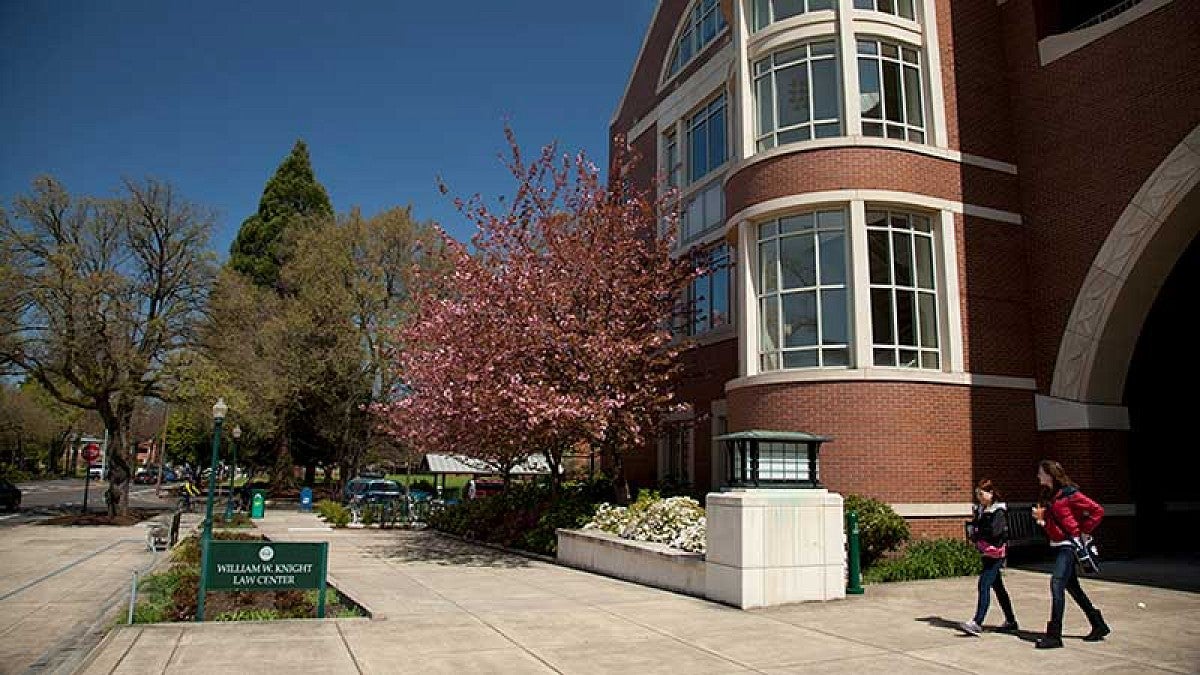The University of Oregon School of Law will launch three summer programs for current law students whose summer employment has been interrupted by COVID-19.
Through generous donations and grants, the school raised more than $110,000 in sponsorships for the Summer 2020 Litigation Lab, the LawMeets 2020 Mergers and Acquisitions Boot Camp, and the Environmental and Natural Resources Summer Research Program.
Usually, summer is a time for students to expand their legal education beyond the bounds of the law school building. However, this year is quite different. Even though many states, including Oregon, are gradually reopening, that hasn’t translated into secure employment.
Some students have seen job offers rescinded, while others had hours reduced. Many students who had final interviews were disappointed to discover that employers were postponing interviews indefinitely. And some students had to move back home or otherwise shift their job search to care for family members.
“The vast majority of our students typically use the summer months to develop critical lawyering skills and to enhance their professional networks through hands-on work experience,” said Rebecca Ivanoff, assistant dean at Oregon Law’s Center for Career Planning and Professional Development. “We did not want to see students miss out on this important part of their development because of the pandemic. We created these programs to fill that gap, and we prioritized applicants whose summer plans and finances have been impacted by COVID-19.”
According to a survey of first- and second-year law students, 15 percent report being affected by COVID-19.
The law school has received applications for the summer opportunities from people like second-year student Anne Marie Burke. Burke had internship offers from several organizations that all ended up canceling their summer programs entirely.
“The LawMeets Summer 2020 M&A Boot Camp program restored my optimism in having a meaningful (second-year) summer,” said Burke, whose goal is to work as in-house counsel after graduating next year. “This program will allow me to sharpen my contract drafting, negotiation and communication skills.”
In addition to seeing high student participation, the law school also reports that more than 20 law alumni, faculty members, staff and friends have volunteered to serve as volunteer coaches, witnesses, judges and volunteer facilitators in the programs.
A generous grant from AccessLex Institute will allow 10 students to participate in its Summer 2020 Litigation Lab. Sponsorship includes a $2,000 stipend for each student.
The 10-week intensive, online litigation workshop series will be held from June 2 to Aug. 7 and will be facilitated by John V. Acosta, a United States magistrate judge and 1985 law school graduate. The program is designed to teach students effective litigation skills that will make them better and more confident new lawyers.
Generous support from the Nancy and Dave Petrone Business and Law Success Initiative Fund will sponsor 20 students in the LawMeets 2020 Mergers and Acquisitions Boot Camp. Sponsorship includes covering the cost of participating in the boot camp plus a $2,000 stipend per student.
The camp is a 10-week online program designed to teach deal skills to law students. It will be held May 30 to Aug. 7.
Through funding from an outside foundation, a grant and donor support, 10 part-time and 12 full-time research assistants are being sponsored to participate in the Summer Research Program held by the Environmental and Natural Resources Program at the School of Law. Students will receive stipends that range from $1,500 up to $3,000.
The eight-week program has students work with environmental law faculty members to provide research, analysis and solutions to environmental problems in Oregon. As part of the work, each student will support one or more of the program’s flagship interdisciplinary projects: the Conservation Trust Project; the Energy Law and Policy Project; the Food Resiliency Project; the Global Environmental Democracy Project; the Native Environmental Sovereignty Project; the Oceans, Coasts, and Watersheds Project; and the Sustainable Land Use Project.
—By Rayna Jackson, School of Law


